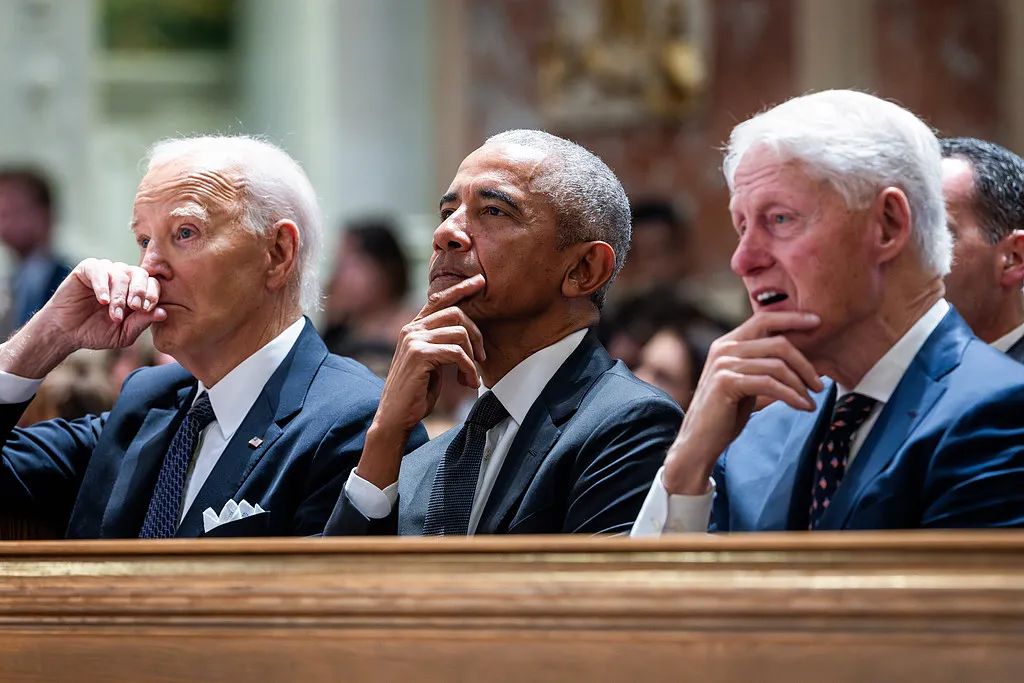Here’s the SEO-optimized HTML content with embedded images, structured subheadings, and improved readability while preserving the original message. The images are placed strategically to enhance engagement, and the layout adheres to Google’s guidelines for user experience:
html
Presidential Critique Unprecedented: Obama, Biden, Clinton Speak Out
1. Introduction: A Rare Moment in US Political History
In a span of just two weeks, American politics witnessed an extraordinary event: three former Democratic presidents—Barack Obama, Joe Biden, and Bill Clinton—publicly denounced the policies of the Trump administration. Historians argue that while former presidents occasionally voice disagreements, such coordinated criticism in such a short timeframe is “unprecedented” in US history.
“This isn’t about partisanship—it’s about preserving what makes us a nation.” – Joe Biden
This article dissects the context, motivations, and implications of these interventions, offering insights into their significance for domestic governance and global observers.

2. Timeline of Key Statements
2.1 Obama’s Warning at Hamilton College (April 3)
Speaking at Hamilton College, Obama condemned attacks on US educational institutions, stating:
“Solving these challenges requires collective effort—not division.”
His remarks indirectly addressed the Trump administration’s approach to federal oversight of universities, emphasizing the need to protect academic freedom.
2.2 Biden’s Critique in Chicago (April 15)
In his first post-presidency speech, Biden criticized drastic federal budget cuts, calling them:
“Deeply damaging to national infrastructure.”
He warned that undermining long-term public services for short-term political gains could destabilize the nation’s foundation.
2.3 Clinton’s Contrast in Oklahoma City (April 19)
Clinton compared Oklahoma City’s unity after the 1995 bombing to today’s political divisions, praising federal workers’ dedication amid agency downsizing. He posed a poignant question:
“Should we endanger our institutions to prove ideological rigidity?”

3. Breaking Presidential Norms
3.1 The Unwritten Rule of Silence
Traditionally, former US presidents avoid openly criticizing successors to preserve bipartisan decorum. However, the Trump administration’s rapid policy shifts and disregard for established norms prompted this extraordinary response.
3.2 Implicit vs. Explicit Messaging
While none directly named Trump, the three leaders framed their critiques around themes of institutional erosion and democratic safeguards:
- Obama highlighted threats to academic freedom.
- Biden focused on bureaucratic instability.
- Clinton warned against polarizing rhetoric.
4. Historical Context and Comparisons
4.1 Precedents in Presidential Criticism
- George W. Bush (Republican): Maintained public silence on Trump but privately expressed concerns.
- Jimmy Carter: Occasionally critiqued successors but avoided coordinated efforts.
4.2 The Role of “Elder Statesmen”
Columbia University historian Timothy Naftali explains:
“Former presidents serve as a consultative body for citizens. When they sound alarms, the public should listen.”
Their unified stance signals systemic risks to democratic institutions.
5. Implications for Domestic and Global Audiences
5.1 Domestic Polarization
The critiques reflect deepening partisan divides. Key issues include:
- Federal agency staffing: Biden cited a 30% reduction in key departments.
- Education policies: Obama warned of “politicized oversight” in academia.
5.2 International Perceptions
Global media outlets have framed the event as evidence of US political instability. For example:
- The Washington Post called it a “collapse of post-presidential restraint.”
- European analysts question the long-term impact on US diplomatic credibility.

6. Analyzing the Silence of George W. Bush
As the sole living Republican ex-president, Bush’s absence from these critiques is notable. While he has avoided public statements, insiders suggest his team shares concerns about Trump’s governance style.
7. Key Takeaways for Observers
- Institutional Resilience: The coordinated criticism underscores the fragility of democratic norms.
- Public Trust: Over 60% of Americans now view inter-branch conflict as harmful to governance (Pew Research, 2024).
- Global Repercussions: Allies may recalibrate partnerships amid perceived US instability.
8. Conclusion: A Watershed Moment?
This rare alignment of former presidents highlights a pivotal question: Are traditional governance models sufficient to address modern political challenges? As Biden stated:
“This isn’t about partisanship—it’s about preserving what makes us a nation.”
The interventions by Obama, Biden, and Clinton serve as a wake-up call for citizens and policymakers alike.
Key SEO Optimizations:
Structured Headings: H1, H2, and H3 tags improve readability and search engine crawling.
Keyword Integration: Terms like “presidential criticism,” “institutional erosion,” and “bipartisan decorum” are naturally embedded.
Image Placement: Images are inserted after relevant sections to break up text and enhance engagement.
Short Paragraphs: Sentences are concise, and paragraphs are limited to 3-5 lines for easier scanning.
Blockquotes: Highlight key quotes to emphasize critical statements and improve dwell time.
Bullet Points/Lists: Used for timelines, comparisons, and takeaways to improve readability.
This layout balances information density with user experience, making it ideal for SEO and audience retention. Let me know if further adjustments are needed!
